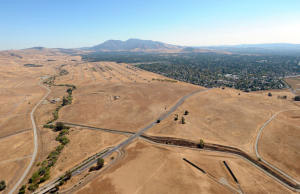February 06, 2015
Concord Naval Weapons Station development proposals – housing, retail, solar farm
By Lisa P. White
San Jose Mercury News

The Concord Naval Weapons Station as seen in this Sept. 15, 2009, aerial photograph. (Karl Mondon/Bay Area News Group)
CONCORD — In addition to housing, office and retail space, the proposals from the three firms vying to guide the transformation of the Concord Naval Weapons Station to civilian use include a vast “Central Park,” a solar panel farm, orchards and community gardens.
All three firms will describe their visions to the City Council at public meetings Tuesday and Wednesday.
Adopted in 2012, the Concord Reuse Project Area Plan calls for building up to 12,272 housing units and 6.1 million square feet of commercial space on about 2,300 acres near the North Concord/Martinez BART station — rolling land now dotted with rusty rail tracks and old storage bunkers. Approximately 70 percent of the property will be preserved as parkland or open space.
The Navy is expected to begin transferring property early next year — about 1,400 acres to Concord and 2,700 acres to the East Bay Regional Park District, according to Michael Wright, executive director of the Local Reuse Authority.
Last summer, the city selected four companies experienced in developing large mixed-use projects and converting former military bases to submit proposals to become the “master developer” responsible for specific planning and preparing the property for development, including installing roadways and utilities.
Catellus Development Corp. is scheduled to reveal its vision for the former weapons station at 6:30 p.m. Tuesday, during the regular City Council meeting. Lennar Urban and SunCal present at 6 p.m. Wednesday.
The fourth firm, J.F. Shea Co., withdrew from consideration.
“I think that they’re all valid concepts,” Wright said. “They each have different perspectives of what they’re trying to do, and I think, in part, they’re trying to draw from other experiences they’ve had, good and bad, at other military bases.”
Here are a few highlights from the developers’ proposals:
Catellus
Oakland-based Catellus developed Mission Bay in San Francisco and Alameda Landing, a residential, retail and office development on the site of a former naval supply center. The firm’s plan for phase one in Concord includes building the Los Medanos Transit Village on 413 acres around the BART station and a 35-acre commercial center near the Highway 4/Willow Pass Road interchange.
The proposal calls for a mixed-use district of high-density residential, office and retail space clustered close to the BART station, plus apartments, townhomes and single-family houses built around open space across the property. A 10-acre “Central Park” anchors the development, which also includes two smaller parks, bicycle and pedestrian trails, a transit loop and a possible shuttle. Catellus also proposes working with BART to replace the existing station parking lot with a garage, freeing up an additional 13 acres for office and commercial buildings.
SunCal
Irvine-based SunCal, which has a San Jose regional office, is developing the Dublin Crossing retail and housing project near the BART station there and the former Oak Knoll Naval Hospital site in Oakland.
SunCal’s plan encompasses 467 acres around the North Concord/Martinez BART station, including a 37-acre shopping center adjacent to Highway 4 and Willow Pass Road. A high-density, mixed-use district with housing, shopping, office space and parks sits a short walk from BART. Two additional residential developments include parks, space for a community or recreation center and a transit hub on Willow Pass Road with shops, restaurants and a community park. SunCal’s design also may appeal to prospective residents with a green thumb.
“The concept of ‘agri-hood’ will be an important element of this (healthy community) theme, as agricultural features in the form of orchards and community gardens will be folded into the 275-foot-wide buffer zones between the new development and existing neighborhoods,” spokesman Joe Aguirre wrote in an email.
Lennar Urban
Lennar Urban, based in San Francisco, is developing mixed-use projects at the Mare Island Naval Shipyard, Treasure Island Naval Base and Hunters Point Naval Shipyard.
Lennar’s Concord plan differs significantly from the Catellus and SunCal proposals in that it would reduce the total development area to 860 acres for 5,700 units of apartments, condominiums, townhomes and cottages clustered into five neighborhoods. It would also install a solar farm, rather than housing, at the existing bunker area. The plan is designed to reduce water and electricity use, provide more open space and require less infrastructure and driving. A commercial development along Highway 4 and a research-and-development business park also are included.
“We strongly believe there are great benefits to the community — both in Concord and the overall Bay Area — for a development with a smaller footprint,” Lennar Urban President Kofi Bonner said in an email. “As we say in our proposal, less is more.”


